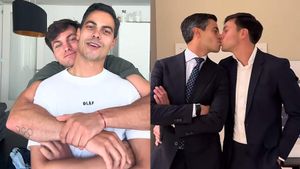All Rights reserved
By continuing to use our site, you agree to our Privacy Policy and Terms of Use.
Starting HIV treatment can be overwhelming, especially when you’re sitting across from a doctor, unsure of what to say. In Plus’ The Talk, individuals living with HIV open up about their first conversations with health care providers, offering real-world advice, reassurance and honesty. From must-ask questions to knowing your boundaries, The Talk is a guide to feeling seen, heard and empowered from the very first appointment.
This season, we bring together Project Lazarus Executive Director Ian Bicko, public health specialist Elena Linas, dancer and advocate Danny Ochoa, and entrepreneur Tatania Riley to reflect on how speaking openly about their diagnoses became a source of strength rather than shame.
Linas explains that her journey toward openness wasn’t immediate. It took her years to reach a place where she felt comfortable, and that hearing others share their experiences — even online — gave her the confidence to do the same. Discovering a woman on YouTube who spoke candidly about her diagnosis was especially powerful, since she had never personally known another woman living with HIV.
“I realized the way that people find encouragement is by me speaking about my status,” Linas adds.
Ochoa recalls that before his diagnosis, the hardest part was knowing his parents didn’t yet know he was gay. He eventually sat them down and shared the truth — so when his HIV diagnosis followed, he felt he had no choice but to be just as open. To his relief, they stood by him, and that support helped him let go of fear.
“Since my diagnosis, I’ve started trying to use my voice,” Ochoa says. “I do community-based prevention and outreach, and this is my call!”
Bicko notes that for him, stepping into advocacy was always a natural path, though he acknowledges that isn’t the case for everyone. He encourages others to give themselves time to process a diagnosis before diving into activism.
“It really has been life-changing,” Bicko says. “It made me realize how not alone I am. It’s also made me realize how many people out there care.”
According to Riley, HIV has opened a whole new world for her.
“When I started opening up to the community, my family, friends, it made me feel good about myself because I knew I had a voice that needed to be heard,” Riley explains. “HIV is not a death sentence. It’s a whole new chapter of my life, a whole new me.”
Watch the episode above and catch more episodes of The Talk HERE.From our Sponsors
Most Popular
BREAKING: Supreme Court rules to save free access to preventive care, including PrEP
Thanks to U=U, HIV-positive people can live long, happy, healthy lives
The Talk: Beyond the exam room
Latest Stories
Amazing People of 2025: Javier Muñoz
It’s National PrEP Day! Learn the latest about HIV prevention
“I am the steward of my ship”: John Gibson rewrites his HIV narrative
“So much life to live”: Eric Nieves on thriving with HIV
The lab coat just got queer
Messenger RNA could be the key to an HIV vaccine — but government cuts pose a threat
The Talk: Navigating your treatment
The Talk: Starting the conversation
How the Black AIDS Institute continues to fill in the gaps
“I felt like a butterfly”: Niko Flowers on reclaiming life with HIV
Dancer. Healer. Survivor. DéShaun Armbrister is all of the above
1985: the year the AIDS crisis finally broke through the silence
VIDEO: A man living with HIV discusses his journey to fatherhood
Trump admin guts $258 million in funding for HIV vaccine research
Grindr is reminding us why jockstraps are so sexy and iconic
HRC holds 'die-in' to protest Trump health care cuts
Two right-wing Supreme Court justices signal they may uphold access to PrEP and more
500,000 Children at Risk: PEPFAR Funding Crisis
Trending stories
Recommended Stories for You




































































